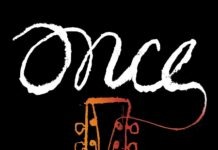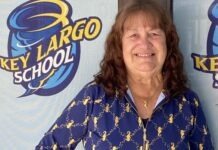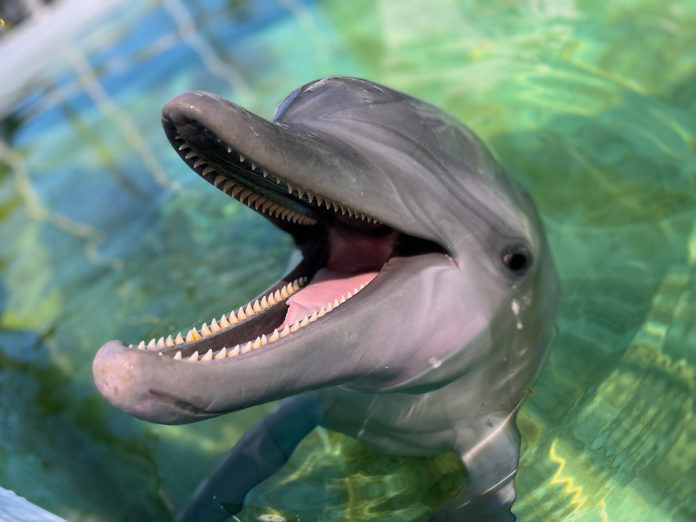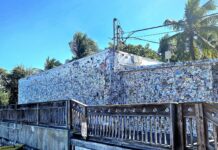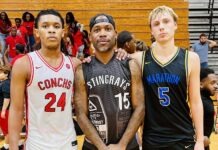On March 25, the Dolphin Research Center pod added a new adopted member: an adorable 2-year-old ball of energy named Ranger.
Originally rescued in June 2021 from Goose Island State Park in Texas, where he was found orphaned near his deceased mother and suffering from a respiratory infection and dehydration, the calf was transported to Texas State Aquarium’s Wildlife Rescue Center for rehabilitation.
Due to his young age at the time of his rescue – most calves stay with their mothers for several years learning to hunt and survive, and Ranger was estimated to be just over a year old – the National Marine Fisheries Service (NMFS) deemed him non-releasable.
The service eventually selected DRC as his forever home. Last week, the little dolphin made his way from Texas to the Keys in style on a flight donated by Tampa-based Jet I.C.U., an air ambulance service.
The company originally wanted DRC to cover some of its costs, but a call from Jet I.C.U. CEO Mike Honeycutt mere days before the transport told another story. “He said, ‘take whatever money you raised and give it to DRC,’” said Linda Erb, DRC’s vice president of animal care and training. “Their pilots were amazing. The captain of the flight took his wings off, gave them to us and said, ‘Ranger has his wings now.’”
Currently in a quarantined medical pool with treated and purified salt water, Ranger will progress through a monitoring period in which a slow introduction to natural water from the Gulf of Mexico will help rebuild any missing links in his immune system. When coupled with a relatively short rehab period after more than a year in the open ocean, Ranger’s young age should allow him to adapt well as he returns to DRC’s natural lagoon environment. His caretakers will monitor him with constant observation and repeated blood tests, but so far he seems to be doing just fine.
“For all practical purposes, he’s a healthy little dude now,” said Erb, noting that Ranger has grown more than a foot and gained more than 100 pounds since his original rescue.
In about a month, it will be time for him to meet his adopted family. Introductions will likely begin with some of DRC’s adult and juvenile females who may be willing to adopt the little one, and the hope is that the center’s two expecting females will eventually raise calves close in age to Ranger.
In the meantime, the priorities for his trainers are playtime, basic training, and teaching him not to play with his food. After all, he’s only 2.
“It’s both fun and a little overwhelming, because we’re all he has right now,” said Erb. “When he’s out there in the lagoons, he’ll have other dolphins to play with. He’s pretty good at entertaining himself, but the goal is to get him out there to meet his family.”
Ranger is slowly learning to keep his food in his mouth, a vital skill if he wants to avoid losing some of his meals to opportunistic mangrove snappers in DRC’s lagoons. He’s even learning to touch a plastic symbol, much like a nametag, at the start of his sessions – a cowboy boot, fittingly created for his name and origin. And when it comes to playtime with his favorite toys, let’s just say DRC is lucky his pool has a fence around it.
Within seconds of being reintroduced to one of his favorite toys from the Texas State Aquarium during this interview, the young dolphin was having a ball punting the inflatable donut around the pool with his tail, at one point narrowly missing his trainers and this reporter. But according to several of his caregivers, this is nothing new, especially when the youngster wants attention.
Erb said seeing Ranger finally touch down and make his way to his forever home was a relief after the stress of working through logistics leading up to the transport. However, the support of the Marathon community and DRC’s staff, volunteers, donors and supporters has been unwavering throughout the process.
“We couldn’t do this without everybody,” she said. “It’s a community effort all the time. Marathon and the Keys are our home, and we get so much support all the time, but it even goes beyond that. The friends and connections you make down here keep coming through for you. We appreciate all the support in helping us do what we do, which is give these guys forever homes.”
